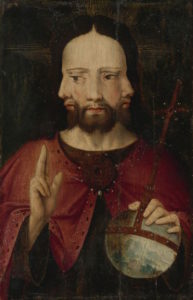In the most recent issue of First Things, Richard Mouw, President Emeritus of Fuller Theological Seminary, has published an important article, “Mormons Approaching Orthodoxy.” He argues that the Church of Jesus Christ of Latter-Day Saints (LDS) seems to be moving toward a more “orthodox” concept of God. Much of his discussion concerns the canonical status of comments made by early Mormon writers, including the church’s founder, Joseph Smith, Jr., which affirm that God and man are of the same species, and that God was once a man (prior to becoming God) and that man may become in the future what God is now.
One of the early giants of the Mormon faith, Lorenzo Snow, who would eventually serve as the fifth president of the Church (1898-1901), in 1840 succinctly put this in the form of a couplet: “As man now is, God once was;/ As God now is, man may be.”
As Mouw rightly notes, this is doctrinally incompatible with the understanding of God found in traditional Christian theism, which teaches that, “God and human beings are of different orders of `being.’ The God of the Bible is the totaliter aliter, the Wholly Other. He infinitely transcends his creation.” Nevertheless, Mouw argues that recent comments and publications by LDS ecclesial leaders and thinkers reveal a shift on how contemporary Mormons ought to properly interpret their tradition, which allows for an account of the divine that seems closer to “orthodoxy” than earlier accounts.
In an online reply—“Are Mormons Actually Moving Toward Orthodoxy?”—Beeson Divinity School theologian Gerald McDermott disagrees with Mouw, pointing to canonical works and official LDS website posts that seem to suggest that the traditional Mormon position is still official doctrine, notwithstanding the recent comments and publications mentioned by Mouw.
Although I am inclined to accept Mouw’s account of the development of LDS doctrine over McDermott’s, each seems to assume that there is an “orthodox” dogma of God’s nature that is accepted without controversy by Protestants, Catholics, and Orthodox. (It should be noted that when I write “Orthodox” with a capital “O” I mean the Eastern Orthodox Churches, but when I write “orthodox” with a small “o,” I mean what Mouw and McDermott mean, what traditional Christians of virtually all denominations hold in common).

Mouw, for example, writes: “While John Calvin’s manner of depicting the ontological gap is admittedly rather stark as compared to other Christian theological traditions, there’s little disagreement on the main point. Wesleyan, Catholic, and Eastern Orthodox theologians also insist on the `being’ gap between the Creator and human creatures. God alone possesses the ‘omni-’ attributes.”
One hundred years ago, Mouw would have been right. But it turns out that among contemporary Evangelicals the “orthodox” concept of God is itself now contested, with some Evangelicals offering an account of the divine that is closer to the LDS view than it is to the classical view.
Prior to the 20th century, virtually every non-Catholic Christian community, theologian, and minister could confess without reservation the description of God offered by the Second Lateran Council (1215): “We firmly believe and simply confess that there is only one true God, eternal and immeasurable, almighty, unchangeable, incomprehensible and ineffable, Father, Son and holy Spirit, three persons but one absolutely simple essence, substance or nature.”
As Reformed theologian James Dolezal points out in his outstanding book, God Without Parts: Divine Simplicity and the Metaphysics of God’s Absoluteness, this was the uncontroversial understanding of God’s nature that Catholics, Protestants, and Orthodox held in common. In fact, for Catholics, it is a de fide dogma, which means that it is an essential belief of the Church.
But things have changed. Some of the leading and most respected theological minds of Evangelicalism have rejected at least one, and in some cases almost all, of these attributes. “Incomprehensible” and “ineffable” are rejected by those who believe that our language about God and man should be univocal rather than analogical. (Edward John Carnell, William Lane Craig, and Alvin Plantinga come to mind). Because without analogical predication divine “simplicity” doesn’t stand a chance, some thinkers jettison simplicity as well. (Craig, Plantinga, and Richard Swinburne take this view). Some forms of “social trinitarianism,” such as Swinburne’s, seem like tritheism, and thus are not only incompatible with “the three persons. . .[being] only one absolutely simple essence,” but also with the belief that there is “only one true God.”
Although these thinkers say that God is “eternal” and “unchangeable,” they re-interpret these terms in a way that their confessional predecessors would have not recognized. Some argue that God is eternal insofar as he has always existed, but not in the sense that he is timeless, which is how Protestants had always understood that term until recently. In a similar fashion, God is only “unchangeable” in the sense that he remains the same being everlastingly, but not in the sense that his judgments, decisions, and acts do not depend on the being and activities of what is non-divine, such as human beings and their free acts.
There are other Evangelical thinkers who even go further and deny that God knows the future. They reason that because God is in time, and because divine foreknowledge is incompatible with libertarian free will, God cannot have knowledge of future contingencies.
So we live in interesting times religiously. It may be that the distance between LDS theology and “orthodoxy” is narrowing, bur not only because of developments within the Mormon world. Protestant and Evangelical “orthodoxy” has moved as well.















